The Unseen Scars: A Father’s Reflection on a Tragic Case of Child Abuse
Ada County Sherrif
As a father, there are certain stories that shake you to your core, forcing you to look at the world through the vulnerable eyes of your own child. The case of Gilberto Roman-Lopez, recently convicted of sexually abusing two young girls in Boise, is one of those stories. It is a stark, gut-wrenching reminder of how predators operate in plain sight, preying on the innocence of children who trust them.
This isn’t just another courtroom headline. It’s a testament to the silent battles so many survivors of childhood abuse fight—years, sometimes decades, after the trauma first takes hold. These two young women, now in their early 20s, carried their pain for years before finding the courage to speak up. Their strength in facing their abuser in court is nothing short of heroic.
How Abuse Happens: The Textbook Playbook of a Predator
If you’ve ever wondered how such horrors can unfold under the noses of everyday families, this case lays it out in chilling detail.
Roman-Lopez didn’t fit the stereotype of a shadowy figure lurking in the dark. He was someone familiar, a trusted relative, a neighbor, a presence in the girls’ daily lives. He found moments of opportunity—times when his wife was away, when the children were unsuspecting, watching TV or a movie, assuming they were in a safe space.
Predators like him don’t rely on violence; they rely on trust. They normalize the inappropriate behavior over time, creating confusion, fear, and silence in their victims. The abuse wasn’t reported until years later, which is tragically common. Many survivors struggle with self-doubt, shame, or the fear of not being believed.
The Aftermath: When Justice Takes Too Long
What makes this case even more infuriating is how long it took for justice to catch up with him. The abuse was first reported in 2014, and what did he do? He ran. He left his car, his phone—his whole life—behind and fled. He knew what he had done, and he knew the walls were closing in.
But for ten years, he remained free while his victims lived with the burden of their trauma. That’s the brutal reality of cases like this. Even when justice is eventually served, it’s often delayed by bureaucracy, legal loopholes, or the cowardice of perpetrators who disappear into the wind.
The Courage of Survivors
What struck me most in this case was how these young women carried their pain for so long, only to face it head-on in a courtroom. One of them couldn’t even lift her eyes to meet the jury. Another spoke clinically, almost like she had to detach herself just to get through it.
This is the reality of childhood trauma. It doesn’t disappear once the abuse stops. It lingers in their sense of safety, in their ability to trust, in their relationships, and in the way they move through the world. The courtroom wasn’t just a place for justice; it was a battleground where they had to relive their worst nightmares in order to ensure that their abuser would never harm another child.
What Can We Do?
As a father, I ask myself: How do we protect our children from people like this? How do we make sure they feel safe enough to speak up?
Create an environment of open communication. Our kids should know that they can come to us about anything—no matter how uncomfortable it might seem.
Teach them about boundaries. Not just "stranger danger," but the reality that sometimes, the people who hurt them might be familiar and trusted.
Watch for behavioral changes. Anxiety, withdrawal, sudden changes in mood—these can be signs that something isn’t right.
Believe survivors. These young women had nothing to gain by coming forward, only more pain to endure. It’s up to us to listen and support those who share their stories.
This case may be closed, but the scars left behind remain. And while justice was served, we have to ask ourselves: How many other children are still suffering in silence?
Let this be a wake-up call. The best way to prevent another story like this is to remain vigilant, informed, and unwavering in our commitment to protecting the most vulnerable among us.

